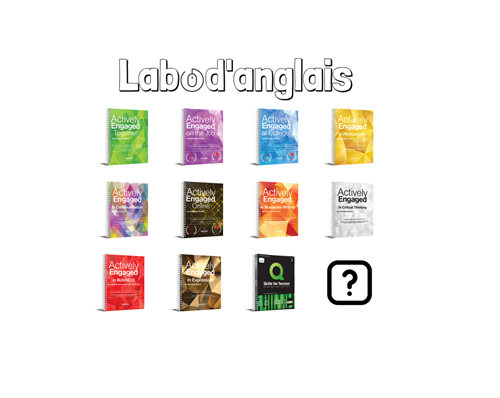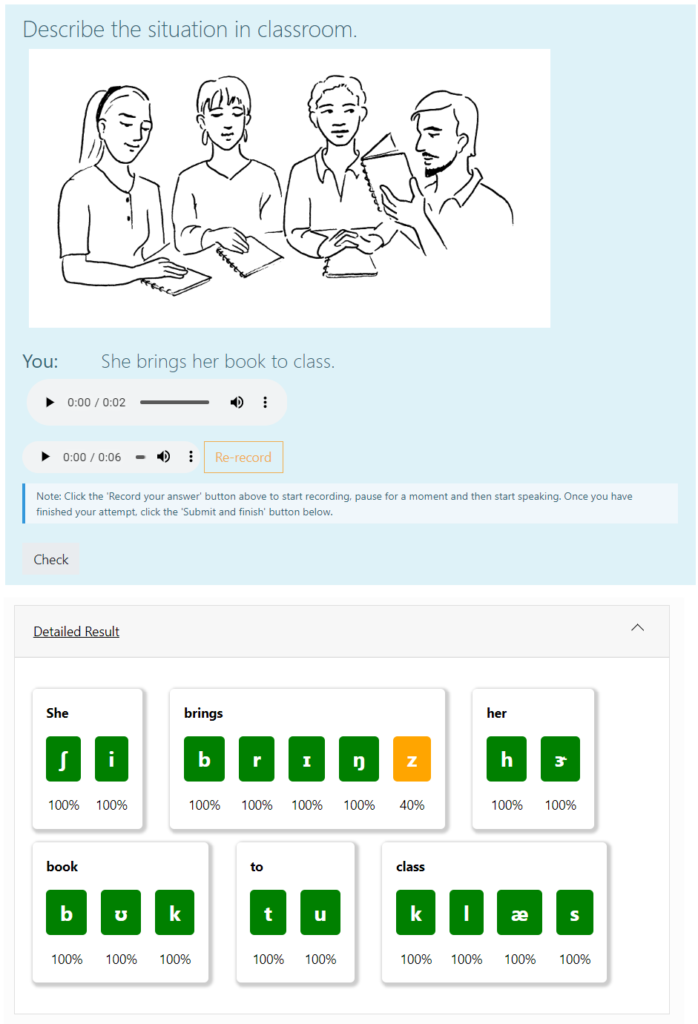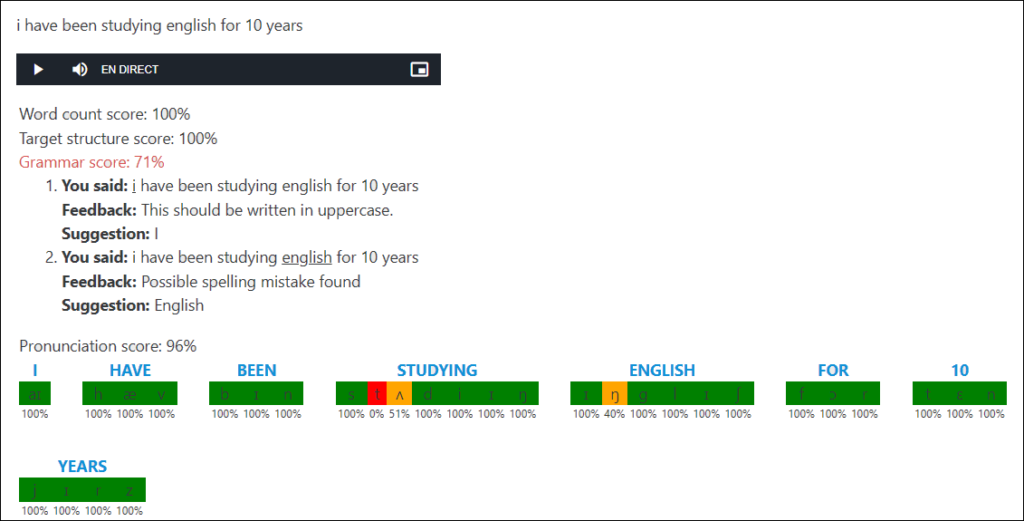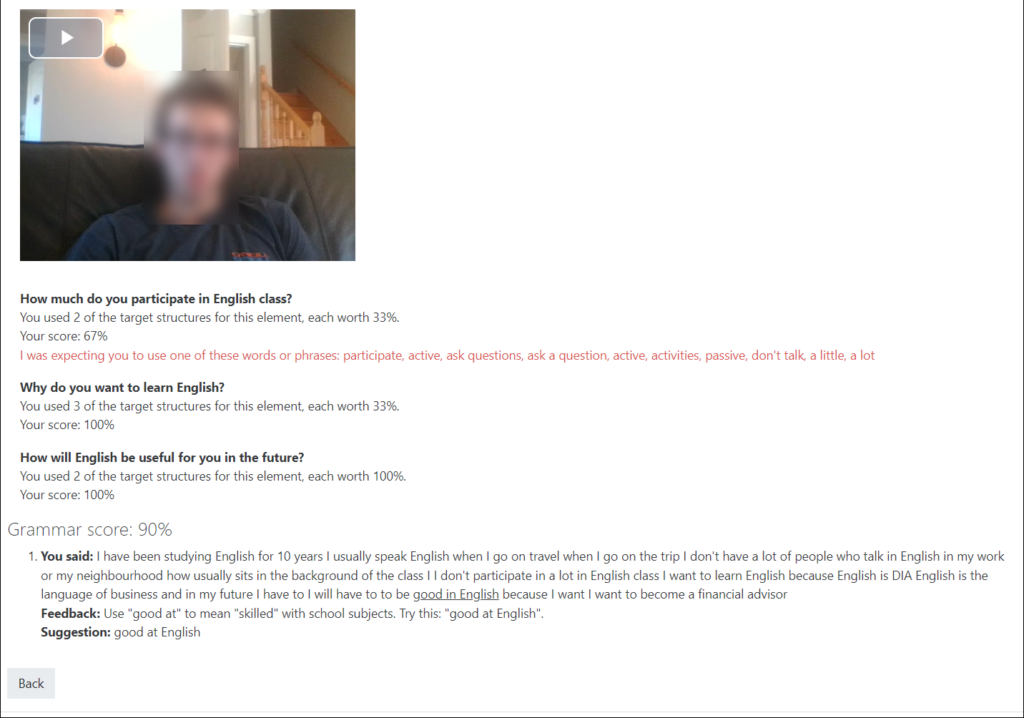
Why Labo? 10 Reasons
There 10 distinct advantages of using Labodanglais.com with your students. The values and goals are the first two. Five automated speaking and writing evaluation tools are next on the list. Textbooks and repositories are eight and nine because extensive, coherent, and cohesive activities keep students engaged. Number ten? It is the most revolutionary. Labo can make authentic communication the beating heart of every course you teach.
Backstory
Labodanglais.com started life in 2009 as a companion website for the Actively Engaged Series of textbooks. Moodle was still quite young and our colleagues were still wheeling around overhead projectors with transparencies and correcting quizzes by hand. The red pen ruled the weekend.
Labo came to the rescue with self-scoring quizzes, drawing questions at random from question banks to foil cheaters. Using audio and video online at the time required Flash and Shockwave plugins, bandwidth was an issue, and textbooks shipped with CDs and DVDs. Fingerprints and scratches could wreck your lesson plans. Slowly, interactive courses with grammar activities, reading and listening evaluations, PowerPoint lessons, and a gradebook with mastery model scoring transformed our courses. These were not unique to Labodanglais nor Bokomaru Publications, but they were still new to many teachers.
In 2012 while students were on strike, VirtualWritinigTutor.com was born, helping to check grammar. Since then, I have been working on ways to score and correct student writing on Labo. Ten years later, Labodanglais is starting to feel like a dream come true. And it all started with some core values and common pedagogical goals.
Values and goals
Let’s explore the core values and goals that Labodanglais is built upon.

1. Labodanglais is for teachers by teachers.
How is Labo for teachers? Labodanglais.com is a Moodle website with unparalleled support. When you learn Labo, you learn Moodle. The skills you develop here are transferable. The help you receive is immediate. When you develop activities on Labo, you keep the copyright. Your content is portable. You can take it with you. When you use our PowerPoint lessons, you are free to modify and adapt them forevermore. If you build your own course on Labo, there’s tons of interactive content for you to use, and there’s a team of developers to help create custom content for you.
Other publishers aren’t really for teachers or by teachers, are they?. They are corporations staffed by employees. Corporations want to keep teachers captive so that when you move on, you leave with nothing. Lessons you have given based on another publisher’s book will never be yours.
Not Labo. Labo supports your professional development, recognizes your copyright, and guarantees your freedom to use our PowerPoints and handouts. Why? We’re teachers, too. What does that mean? Teachers help each other. If you need extra support, you’ve got it. If a deserving student has a special need, expect all the help a teacher would give and more. The accountants don’t run the show here. Teachers do.
2. Labodanglais supports good pedagogy.
Good pedagogy means a focus on students. If the classroom you are standing in resembles the classrooms of the past in any way, it is time for an update. Everywhere we look, students are anxious, resistant, and bored with the traditional model. The focus groups that design the corporate textbooks on your shelf give teachers more of what teachers are accustomed to but not what students need. Banality in, banality out. No thatnks!
In contrast, Labo is shaped by practical theories of learning from Applied Linguistics and robust research findings. We ask, “What would a classroom look like if students had the learning opportunities they need and crave?”
Labo delivers social language, embedded in a social context, with a social motivation to learn, and the fluency for social language use. How? Labo harnesses Skill Acquisition Theory to maximize the repeated, social exchange of meaningful messages with a focus on target structures and accuracy. Goal-oriented, repeated, meaningful, social, and form-focused content–that’s what leads to efficient learning!
In most courses, the goal is to pass the exam or write a final essay. For Labo users, it’s authentic communication. Students are fed up with the pedagogy of drill, display, and forget. They know a fake when they see one. However, students thrive and engage when lessons are built around socially constructed narratives, politically engaged persuasions, real-world digital projects, and authentic communication, with automated feedback keeping everyone focused on the targets. That’s good pedagogy. That’s Labo.
Automated speaking evaluation
Labodanglais has features you will find nowhere else. Ask your IT expert if they have any of the following pedagogical power tools on your college Moodle. Your expert will keep you waiting for three weeks while they do their research, only to tell you after they have kept you waiting in suspense, nope, they don’t exist or the college won’t pay for them. They do exist–on Labo.

3. Labodanglais automatically scores students’ pronunciation in quiz format.
Students listen to a model, and then they record themselves saying it into their microphone. The system provides explicit colour-coded feedback on pronunciation errors. In the traditional classroom, teachers just don’t have time for pronunciation training. At best, you might find a teacher who does choral repetitions making the occasional corrections amid the roar. Automated pronunciation quizzes provide every student in the class with individualized feedback.
It this student’s attempt, you can see that she has trouble pronouncing the “s” at the end of words. Instead of “brings,” the student pronounced “bring.”

4. Labodanglais automatically scores semi-structured speaking tasks.
Early attempts at using a new target structure require short, focused production exercises. With semi-structured speaking tasks, students answer a series of questions intended to elicit the target structures taught in the lesson. Students simply compose their own meaningful answers in writing in the text box, and then record themselves reading their answers aloud. This two-step compose and pronounce process bridges a gap. Student may know about a target structure they have seen or heard. They may have repeated the structure, mimicking the model. But students need help getting to those early, tentative, meaningful experiments with the target structure as a productive skill. It is in this early phase of skill acquisition that students need carefully controlled production activities with focused correction of their grammar and their pronunciation errors.
Focused feedback is what semi-structured speaking tasks do best. The system checks that the student has written enough (word count), that he or she has used the target structures from the lesson (target check), that there are no grammar errors (grammar check), and then checks the students pronunciation, providing explicit feedback on errors.
Here’s an example of what a student wrote and said. You can see that he mispronounced “studying” as “stoodying.” He also received feedback on his two capitalization errors, a persistent problem with many students.

5. Labodanglais automatically evaluates webcam oral assignments.
Teachers can create their own webcam oral assignments, and the system will score every student video in under 2 minutes. What features can it score? Word count, grammar, and content. The system generates a transcript of what the student said which provides implicit feedback on pronunciation. It also counts and scores the student’s word count to promote fluency. And the system checks for target words and phrases to ensure the student is on topic.
Here you can see a student recorded himself. (I blurred his face to protect his identity.) The feedback indicates that he didn’t use all of the target structures, and the system detected a preposition error in the phrase “good in English” instead of saying “good at English.”

Automatically scored writing evaluation
6. Labodanglais automatically evaluates simple writing assignments. Teachers can create their own writing assignments, and the system will score every student submission in seconds. What features can it score? Word count, grammar, and content. See this example of a self-scoring text assignment that evaluates summary writing of a YouTube video in a social context. Why? To lighten the teacher’s workload while providing more opportunities for meaningful writing practice.
7. Labodanglais automatically evaluates complex writing assignments. You can integrate our library of automatically scored essays, narratives, cover letters, and emails using the FastAssignment plugin. Not only does the system evaluate the word count, grammar, and content, it can also evaluate the structure of essays, letters, and emails to make sure students have organized their ideas into the required discourse structure.
Textbooks and content banks
Labo is more than a website. We have a series of textbooks that you can order for your students. And we have a bank of interactive materials that you can use to build your own course.
8. Get Actively Engaged textbooks for your students in PDF or printed form.
Whether you are teaching beginners, intermediates, or advance learners, we have a book for you. Contact BokomaruPublications@gmail.com for your sample copy.









When you are ready to order, ask you college bookstore to contact BokomaruPublications@gmail.com for prices and bulk discounts, and we can ship them to you school usually within a week.
9. Sharing cart content repositories
Some teachers choose to create their own courses using a combination of Labo content and their own. One teacher uses another publisher’s book with our interactive content because we offer automated scoring tools that corporations don’t. We are happy to help.



Notice the book icon with the shopping cart. Click it to see the incredible collection of activities that you can build a course with. You can begin exploring right away. Simple create an account and use the enrolment key “sharing” to gain temporary access to the entire repository.
Authentic language use
The last piece of the puzzle in language learning is authentic language use. Most course will give you opportunities to communicate with other who speak the same mother tongue as you. That’s not what is meant by authentic communication is it? Why not just use your mother tongue? No, authentic communication is when the language you are learning is the only language you share with the person you want to talk to. Labo offers that, too. Whether it’s by getting students to send persuasive letters to the House of Commons or by having conversations on WorldChat.Live, Labo students communicate for real.
10. WorldChat.Live
Did you know that students using Labo get a generous discount on World Chat Live conversations—of up to 100% off. Contact me or contact Anne-Marie Lafortune at WorldChat to find out how.
Free for everybody?
Labodanglais is not free. Students must pay for their education just as their teachers paid for theirs. But when paying for anything, if you receive value for your money, you forget the price you paid. It feels like an investment. That’s how it is with Labo. Labodanglais is not cheap, but it is totally worth the investment.
Final thoughts
At colleges in Quebec, teachers measure our workload (CI) by the number of hours we work, the number of students we teach and the number of preparations we have each week. However, we are paid the same whether our course preparations are new or for a course we have taught before. With Labodanglais.com, your preparation is done. We offer tests, assignments, evaluation grids, and PowerPoint slides to support you every step of the way.
The PowerPoint presentations that come with every textbook lesson provide teachers with various, efficient, and fun ways to engage and explain course content. Presentations are visually rich, conceptually relevant, interactive, and modular. All the PowerPoint slides are modifiable, so teachers can adapt the slides to their own style and pacing.

Your corrections are done, too. I don’t just mean multiple choice tests. Competency-based language education in Quebec requires all grammar knowledge to be demonstrated as a skill in the context of a meaningful message constructed by the student. Summative fill-in-the-blank and multiple choice grammar tests have no place in the CEGEP system. Grammar can only be tested in the context of a speaking or writing task. And that’s how Labo evaluates grammar.
AI-enabled scoring of speaking and writing activities keep students learning how to construct messages instead of just filling blanks. Teachers can throw away their red pens. Students get their scores and feedback on grammar automatically and in just a few seconds—not weeks.
It’s a good thing. If you have ever had a student ask to resubmit a writing assignment after getting their grade, you know how conflicted it can make you feel. You want to say yes, but you shouldn’t. Saying yes to multiple drafts from every student means you will lose more of your evenings and weekends to killjoy corrections. That’s certainly how I used to feel.
But now, with our automated scoring system, students can resubmit as many times as they want and watch their scores rise with every revision. Everybody’s happy.
Labo maximizes your impact on student learning while reducing your correction load.
Labodanglais.com
What’s more, Labo makes learning efficient. Every teacher knows that one essay writing assignment at the midterm and one for finals is not enough practice for students. So, what do we do? We teach the same essay structure over again in the B-block course during the next semester. Why? Could it be that we are limiting meaningful writing opportunities in the A-block course because of the impact the dreaded red pen has on our free time?
Labodanglais has made that inefficient model obsolete. When a robot scores and gives detailed feedback on writing assignments, students can write much more and much more often, leading to a more complete mastery of the objectives in half the time. With Labo, you can assign five argument essays, five orals, and a final writing exam and still enjoy your weekends. Or you can assign ten narratives, two screencasts, and 3 blogging projects, and still have loads of time for yourself.
Teachers are paid to be smart—not to work hard. Be smart. Trust Labo to do the heavy lifting.

Labo rewards student effort by encouraging them to redo exercises and assignments to maximize their scores. Since exercises, quizzes, and assignments are automatically scored, do-overs have zero impact on teachers’ workloads. The intelligent gradebook uses mastery model scoring to drop low-scoring evaluations from gradebook categories so that students don’t get discouraged. Students quickly realize that more effort is rewarded.
(Students who have snuck into the wrong level soon discover that they can’t just dazzle the teacher on summative exams every seven weeks. Regular engagement is still required.)
We love teachers.
Some teachers complain that other publishers lose their students quiz scores and aren’t very supportive when there are bugs or questions. In contrast, Labodanglais teachers and students receive support within minutes via email or text message. If you notice a bug or have a question about how to make a change to your course, I can help. We have how-to tutorials and helpful chatbots in every course.
Don’t delay.
Contact us to get your students access to Labodanglais.com today.

